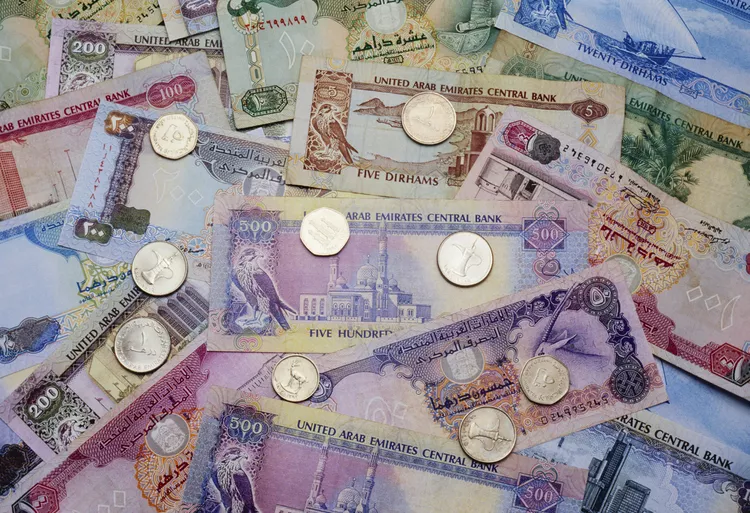Summary
Before you hit the Dubai Mall or dive into Dubai’s vibrant nightlife scene, it’s worth gaining insights about the local currency.
Understanding the Dubai Currency
The official currency of Dubai is the United Arab Emirates dirham, abbreviated as AED and commonly referred to as Dhs or DH. Each dirham is subdivided into 100 fils. Dirham notes come in denominations of:
- 5 (brown)
- 10 (green)
- 20 (blue/green)
- 50 (purple)
- 100 (red)
- 200 (brown)
- 500 (navy blue)
- 1000 (green/blue)
Generally, you will only find 1 dirham, 50 fils, and 25 fils coins in circulation. Most stores often round up to the nearest 25 fils. It is advisable to carry smaller notes, as they are incredibly useful for tipping, and larger notes, especially above 100 dirhams, might be challenging to change in taxis and some convenience stores.
The History of the Dirham
The United Arab Emirates dirham was introduced in May 1973, shortly after the formation of the UAE. The term ‘dirham’ is derived from the Ottoman unit of mass, ‘dram’, which originates from the ancient Greek coin ‘drachma,’ widely traded during the Byzantine Empire.
Since 1997, the dirham has been pegged to the U.S. dollar at a rate of 1 dollar to 3.6725 dirhams. Given that many currencies around the globe are not pegged to the dollar, you should expect daily fluctuations when trading currencies other than U.S. dollars.
Exchanging Currency in Dubai
Exchanging your local currency into dirhams is straightforward. The market is tightly regulated, reducing the chances of being short-changed. As Dubai serves as a significant transit hub, you will find that most money exchangers deal with a wide array of currencies from all around the globe.
For the best exchange rates, consider exchanging a small amount at the airport to cover immediate expenses such as taxis and tips. Once in the city, larger exchanges can be made. Shopping malls are ideal for currency exchange, typically housing banks and money exchange counters. Additionally, it’s wise to compare rates, as money exchanges often provide better deals than banks.
Banks usually operate from Saturday to Thursday, 8 a.m. to 1 p.m. (closed on Fridays). Furthermore, many currency outlets in malls remain open until late evening. Dubai is also equipped with thousands of ATMs conveniently located in shopping malls, metro stations, supermarkets, and air-conditioned street cubicles, typically allowing withdrawals in dirhams directly from your account for a nominal fee.
Using Credit Cards in Dubai
While having cash available is beneficial for tips, taxis, and bargaining in souks (markets), carrying large amounts of cash for significant transactions is unnecessary. Major credit cards like Visa, MasterCard, and American Express are widely accepted at hotels, shops, and restaurants throughout Dubai.
Tipping in Dubai
While tipping is customary in Dubai, it is not obligatory. As a general guideline, if you are pleased with the service at any restaurant, bar or café, a tip between 10 to 15 percent is appreciated, even if a service charge appears on your receipt.
For taxis, it’s customary to round up to the nearest note or give a 5 or 10 dirham note, as most taxis do not accept credit cards. Hotel staff and valets usually receive tips in the range of 5 to 10 dirhams, more for carrying heavy luggage.
For spa and beauty treatments, 5 to 10 dirhams is generally adequate for shorter services such as manicures, whereas 10 percent is advisable for more extended treatments like haircuts and massages.
In Dubai, delivery services are available almost around the clock. Should you desire to express your gratitude to your delivery driver, feel free to let them keep the change or offer them a tip of 5 to 10 dirhams, even if a delivery charge is included in your order.




